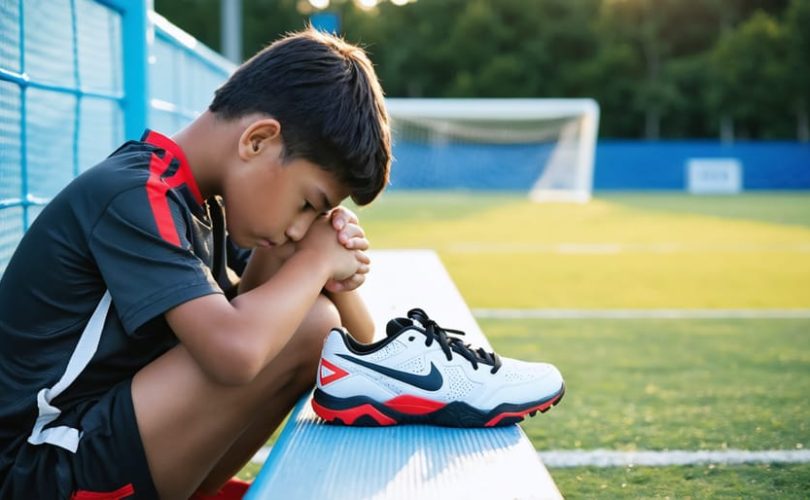While sports often promote physical fitness and teamwork, the impact of sports on mental health isn’t always positive. Behind the medals and victories lies a complex reality where young athletes face unprecedented pressure to perform, often at the expense of their emotional well-being. From anxiety-inducing performance expectations to the crushing weight of perfectionism, youth sports have evolved from simple recreational activities into high-stakes environments that can significantly affect developing minds.
Recent studies reveal that 70% of young athletes experience anxiety before competitions, while 30% report symptoms of depression related to sports performance. These statistics paint a concerning picture for parents and coaches who want to nurture their children’s athletic interests while protecting their mental health. Understanding these challenges is crucial, as early intervention and proper support can make the difference between a healthy athletic journey and one marked by emotional struggles.
As we explore this critical issue, we’ll examine how to recognize warning signs, implement protective measures, and create a balanced approach to youth sports participation.

Performance Anxiety and Competitive Stress
Signs of Unhealthy Competition Stress
As a youth sports psychologist, I often see children displaying subtle signs of unhealthy competition stress that parents might miss. Watch for sudden mood changes, like increased irritability or withdrawal from activities they usually enjoy. Sleep disturbances, including difficulty falling asleep or frequent nightmares about sports performance, can be telling indicators.
Physical symptoms might include unexplained headaches, stomach aches, or muscle tension, especially before practices or games. Some athletes may develop irregular eating patterns or express excessive worry about their weight and appearance.
Pay attention if your child starts defining their self-worth solely through their athletic performance or becomes overly critical of themselves after losses or mistakes. Other red flags include avoiding practice, making excuses not to participate, or showing panic-like symptoms before competitions.
Dr. Sarah Martinez, a pediatric sports counselor, notes that children might also express their stress through seemingly unrelated behaviors, such as declining academic performance or sudden changes in friendship groups. “When a child starts viewing every practice as a must-win situation rather than a learning opportunity,” she explains, “that’s when we need to step in and reassess the situation.”
The Impact of High Expectations
While sports can build character and confidence, high expectations from parents and coaches can create significant pressure on young athletes. Sarah Chen, a sports psychologist with 15 years of experience, notes that many young athletes report feeling overwhelmed by the need to meet or exceed others’ expectations.
“I often see children who love their sport but are crushed by the weight of trying to be perfect,” Chen explains. “They’re not just playing to win anymore; they’re playing to avoid disappointing the adults in their lives.”
These expectations can manifest in various ways: pressure to make the varsity team, win scholarships, or maintain a starting position. Parents might unknowingly contribute by comparing their child to teammates or expressing disappointment after losses. Coaches, particularly in competitive programs, may inadvertently create anxiety by emphasizing results over development.
The impact can be severe, leading to performance anxiety, sleep problems, and even panic attacks before games or practices. Some athletes report feeling that their self-worth has become tied to their athletic performance, creating a dangerous link between sports success and personal value.
Identity and Self-Worth Issues

When Sports Define Self-Worth
When children and teens derive their sense of self-worth primarily from athletic performance, they risk developing an unhealthy and fragile identity. As one high school coach observes, “I’ve seen talented athletes completely crumble after a loss because they’ve tied their entire self-image to their success on the field.”
This connection between athletic achievement and personal value can lead to intense anxiety, depression, and emotional volatility. Athletes may feel worthless after poor performances or injuries, struggling to find meaning in their lives outside of sports. Parents often notice their children becoming overly self-critical, refusing to participate in other activities, or expressing thoughts like “I’m nothing without baseball.”
To build healthier perspectives, it’s crucial to help young athletes develop multiple sources of self-worth. Celebrate their character traits, academic achievements, and other interests. Remind them that their value as a person extends far beyond their athletic abilities, and that success in sports is just one part of their life journey.
Balancing Athletics and Personal Growth
While sports can contribute significantly to a child’s physical and mental well-being, it’s essential to maintain a healthy balance. Parents can help by encouraging their children to explore multiple interests beyond athletics. Set aside time for non-sports activities, family connections, and academic pursuits.
Create open discussions about feelings and expectations, emphasizing that a child’s worth isn’t tied to athletic performance. Celebrate effort and personal growth rather than focusing solely on wins and achievements. Consider implementing “sports-free” days where children can engage in other activities they enjoy.
Watch for signs that sports may be overwhelming your child, such as decreased enthusiasm or anxiety about practice. If needed, adjust schedules to ensure adequate rest and downtime. Remember that the ultimate goal is raising well-rounded individuals who find joy in their activities while developing essential life skills.
Physical and Emotional Burnout
Recognizing Burnout Symptoms
As a parent or caregiver, it’s crucial to recognize when your young athlete might be experiencing burnout. Watch for changes in their usual enthusiasm – if your once-excited child now shows reluctance or anxiety about attending practice, this could be a warning sign. Physical symptoms often include persistent fatigue, unexplained muscle soreness, or frequent complaints about minor injuries that don’t seem to heal.
Pay attention to emotional changes too. A child experiencing sports burnout might become irritable, withdrawn, or show signs of depression. They may start making excuses to skip practice or games, have trouble sleeping, or lose interest in activities they previously enjoyed.
Performance-related signs are also telling. You might notice a drop in their usual skill level, difficulty concentrating during games, or increased frustration with their abilities. Some children might express feelings of inadequacy or show perfectionist tendencies that weren’t present before.
Dr. Sarah Martinez, a youth sports psychologist, notes: “When children start viewing their sport as a source of stress rather than joy, it’s time to step back and evaluate the situation. The goal is to maintain a healthy relationship with sports.”
Remember, early recognition of these symptoms allows for timely intervention, helping prevent more serious mental health challenges down the line.

Prevention Strategies
Maintaining healthy athletic engagement requires a balanced approach and proactive measures. Start by setting realistic goals and expectations with your child, emphasizing personal growth over winning at all costs. Create a supportive environment where open communication about feelings and challenges is encouraged.
Establish clear boundaries between sports and other aspects of life. Ensure your child has adequate rest periods and time for other activities they enjoy. Schedule regular check-ins to discuss their emotional well-being and adjust commitments if needed.
Work with coaches to implement rest days and varied training routines that prevent physical and mental exhaustion. Encourage your child to develop friendships and interests outside of sports to maintain perspective and reduce pressure.
Consider working with a sports psychologist or counselor to develop coping strategies and stress management techniques. Teaching mindfulness and relaxation exercises can help young athletes handle pressure situations more effectively.
Remember, the goal is to foster a love for sports while protecting mental health through balance and support.
Social Pressure and Team Dynamics
Peer Pressure and Team Politics
Team sports, while often celebrated for building character and camaraderie, can sometimes create challenging social dynamics that affect young athletes’ mental well-being. Many young players report feeling pressured to conform to team expectations, both on and off the field. This pressure might manifest as pushing through injuries, participating in unwanted social activities, or adopting behaviors they’re uncomfortable with to fit in.
Dr. Sarah Martinez, a sports psychologist, notes that “The desire to belong can sometimes override a young athlete’s personal boundaries and values.” This is particularly evident in competitive environments where team hierarchy and social status play significant roles. Athletes might feel compelled to participate in risky behaviors or push themselves beyond healthy limits to maintain their standing within the team.
Parents often observe changes in their children’s behavior as they navigate these complex social dynamics. Some athletes might experience anxiety about team social events, worry excessively about their teammates’ opinions, or struggle with feelings of isolation if they don’t conform to team norms. It’s crucial for coaches and parents to create an inclusive environment where individual differences are respected and where athletes feel safe expressing their concerns without fear of social repercussions.
Building Healthy Team Relationships
Building strong team relationships is essential for creating a positive sports environment that supports mental health. Dr. Sarah Chen, a sports psychologist, emphasizes that “healthy team dynamics can act as a protective factor against stress and anxiety in young athletes.”
Start by encouraging open communication between teammates. Create opportunities for players to share their thoughts, concerns, and experiences in a safe, judgment-free space. Team-building activities that focus on cooperation rather than competition can help foster trust and mutual respect.
Coaches and parents play crucial roles in modeling positive social interactions. Celebrate individual progress and team effort rather than focusing solely on winning. When conflicts arise, address them promptly and constructively, teaching athletes how to resolve disagreements respectfully.
Consider implementing a buddy system where experienced players mentor newcomers. This approach helps build confidence, reduces social anxiety, and creates natural support networks within the team. Regular team meetings that discuss both athletic and emotional challenges can help normalize conversations about mental health.
Remember that strong team relationships develop gradually. Patience, consistency, and genuine care for each team member’s well-being are key to creating a supportive athletic environment.
While sports participation can offer tremendous benefits for children’s development, it’s crucial to remain mindful of potential mental health challenges that may arise. Throughout this article, we’ve explored how intense competition, perfectionism, and burnout can impact young athletes’ emotional well-being. However, this doesn’t mean we should discourage sports participation – rather, we should approach it with awareness and intention.
As parents, your role is vital in creating a healthy athletic environment for your child. Stay attuned to warning signs like sudden mood changes, loss of interest, or excessive anxiety about performance. Remember that open communication is key – regularly check in with your child about their feelings toward their sport, their relationships with teammates and coaches, and their overall enjoyment of the activity.
Consider implementing these protective measures: maintain balance between sports and other activities, emphasize personal growth over winning, and ensure adequate rest and recovery time. If you notice persistent mental health concerns, don’t hesitate to seek professional help – many sports psychologists and counselors specialize in working with young athletes.
Most importantly, remind your child that their worth isn’t tied to their athletic performance. By fostering a supportive environment that prioritizes well-being over achievement, you can help your young athlete develop a healthy relationship with sports that contributes positively to their mental health journey.







